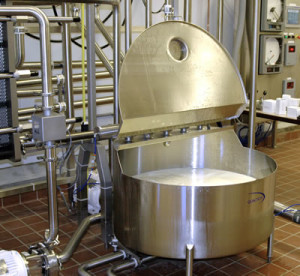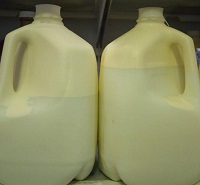Hi mommies,
As a pediatric nutritionist, one of the most frequent questions I get asked about is – “is milk good for you?”, or “when should I stop feeding my child with milk?”
Oh how I wish there was one simple and short answer to these questions. But there aren’t. This week’s post is divided to two parts – part one is dedicated to educating you about the issues with dairy products in general and why cow’s milk is nutritionally different than human milk along with how this difference affects the human body. In part two I will teach you four basic rules to follow when shopping for healthier dairy products, including brand names, so stay tuned!
Is milk good for you?
The dairy industry spends billions of dollars on marketing and advertising milk products as a nourishing food particularly for children, but unfortunately they don’t expose us to the whole picture. Due to this extensive and systematic brainwashing most people associate dairy as the only source of calcium there is, or in other words calcium and dairy have become synonymous in their minds. This is simply wrong, and I want all parents to know that dairy is not an excellent and necessary food for your children! With that said, I do understand that it takes time to wean off of favourite foods.
As always, my philosophy with regards to food is simple – eat what your body needs and likes, without compromising on quality! The purpose of this article is not to tell you not to eat dairy, quite frankly I do buy certain dairy products for two reasons: 1. they are tasty and make any dish yummier and richer in flavour, 2. it is easy to feed kids with it because they love it! Believe me I’ve tried being idealistic and strict about dairy, and for the most part my family already sees me as a food nazi, so in this case I am all for making your (and my) life easier! Up until three years ago we didn’t have any dairy products at home (we still don’t drink milk, and would probably never drink it), but my youngest daughter is obsessed with it, so after a very thorough research and reasoning, I’ve decided to welcome some dairy products into our home, and I want to show you exactly what I choose to buy and why, so keep reading…
Why are we so obsessed with milk?
A newborn baby who feeds on its mother’s milk gets the perfect food, custom made to fulfil its needs, until they are ready for solid foods. Human milk is richly nourishing, soothing to the soul, and helps babies form relationships with other humans (especially when it is introduced through breastfeeding which allows for skin-to-skin connection with mom). Because of this milk, in general, has come to be associated with good nourishment, and with the ease, bliss and innocence of childhood.
According to Annemarie Colbin, author of the book Food and Healing – How What You Eat Determines Your Health, Your Wellbeing, and The Quality Of Your Life: “On the spiritual level, milk reunites us with the “Mother” energy, and supports all the feelings associated with childhood: emotions close to the surface, easy laughter, easy tears, contentedness, dependency. It keeps us in innocent bliss and lacking in conscious awareness. In effect, as long as we consume milk or milk products regularly, we have not been fully weaned – thus regardless of chronological age, we remain unable to attain our full potential as adults.”

In general there are three reasons why dairy is not optimal food for human beings:
- Cow’s milk is different in nutritional composition than human milk
- Cows are raised inhumanely which means they are unhappy and therefore produce milk that is not good for consumption
- Cow’s milk is altered and hampered with, yielding a completely different product than what it was naturally intended for
We’re going to talk about each point in greater detail below
1. How is human milk different than cow’s milk?
Here’s a comparison of nutrients in human milk and cow’s milk:
Macronutrients in grams per 100 grams
|
Protein |
Fat |
Carbohydrates |
|
| Human Milk |
1.1 |
4 |
9 |
| Cow’s milk |
4 |
3.5 |
4.9 |
Micronutrients in milligrams per 100 grams
|
Calcium |
Phosphorus |
Sodium |
|
| Human Milk |
33 |
18 | 16 |
| Cow’s milk |
118 |
97 |
50 |
- Cow’s milk has three times more protein and almost four times more calcium than human milk – this makes total sense since cow’s milk is intended for a growing calf which, when grown, will weigh three or four times as much as a human adult. More calcium in not necessarily a good thing, we’ll talk about it later.
- The ratio of calcium to phosphorus in human milk is 2.35:1 but it is only 1.27:1 in cow’s milk. The lower this ratio is the harder it is for calcium to absorb in the body! Paradoxically, human beings absorb less calcium from the high calcium cow’s milk than from the lower calcium human milk, which means that it’s not the quantity of calcium that matters, but context.
- Human milk has a bit more fat than cow’s milk (4.0 grams as opposed to 3.5 grams). This indicates that removing the fat from cow’s milk destroys the quality of the milk even more since this is the only resemblance it has to human milk.
- Human milk contains only 16 milligrams of sodium, as opposed to the 50 milligrams in cow’s milk. Moreover, salt is added to almost all cheeses to give them flavour. Therefore it seems that cow’s milk, with its naturally occurring excess, along with salted cheese, could be among the most common sources of excessive sodium in our Standard American Diet.
As you can see, cow’s milk is very much different than human milk in nutritional composition and the question which arises most frequently is what is the effect of this difference? The excess protein and calcium resulting from consumption of milk products result in unused matter in the body which must to be excreted through our elimination organs (liver, intestines, lungs, and kidneys). However, due to the excess consumption of dairy products, these organs become clogged and a buildup is formed. This unused matter turns into mucus or pus which is the perfect culture medium for bacteria.
Think about the issues children are faced today – asthma, allergies, strep throat, tonsillitis, ear infections, pimples, acne, weight issues – all are proof that our organs of elimination are not in fine working order! I’ve worked with countless children who, once mom removed dairy products from their diets (or at least was choosing the right products), experienced a significant improvement and alleviation of their symptoms.
2. How cows are raised and why should we care?
In addition to the varied nutritional composition of cow’s milk, there is also the issue of unethical ways the cows are raised. I’ve decided not to include graphic pictures on this post as I hate these pictures myself. This is just a reminder that most cows spend their entire lives on a concrete floor, walking in their manure, crammed to the point they cannot turn around! In addition to that, they are impregnated constantly in order for them to keep producing milk and are separated from their babies right after giving birth.
This is heartbreaking, and by consuming dairy products on a regular basis we are fueling and funding this cruelty on a daily basis!
Have you ever breastfed your baby while you are stressed or unhappy? Did you notice any changes with your baby on these days? When I ask moms this question, they almost always say that baby was colicy, irritable, upset or disconnected while feeding on ‘unhappy milk”. Now think about the cows – how can a sick, miserable or sad animal produce milk that is good for you? It is impossible and therefore, most of conventional dairy products today are not optimal for human consumption, on top of the nutritional differences in milk.
3. Milk is pasteurized, homogenized, fortified with synthetic vitamin D and skimmed
What is pasteurization? Pasteurization is basically heating the milk up to very high temperatures which kills many infectious diseases and bacteria. While the bad guys die, the goodness in milk disappears as well… In tests with animals, calves given their own mother’s milk that had first been pasteurized didn’t live more than six weeks! An increased incidence of problems, including a reduced ability to reproduce, was noted in laboratory animals fed pasteurized milk for several generations. Also, the vitamin C content of milk is reduced by 50% during pasteurization and the live enzymes present in the milk are completely gone through this process as well.

What is homogenization? The homogenization process is blending the milk to very high speeds breaking up the milk molecules into smaller pieces, which allows for a more consistent and smooth appearance. Yes, you’ve read that right, this is only done for appearance sake, making milk appear more uniform and pretty to the eye. This however, also has drawbacks – the small molecules of milk allow some substances to pass through the intestinal wall unchanged by the digestive process, causing many digestive issues such as gas and bloating and even more serious issues such as IBS, crohn’s and colitis (most people are unaware that they are sensitive or allergic to dairy products until they remove dairy from their diet and notice a significant alleviation of symptoms).

Why is milk fortified with vitamin D and why is it a bad idea? Vitamin D was initially introduced into milk with best of intentions – to reduce incidents of rickets in children. This vitamin encourages the deposit of calcium in the body, “Artificially encouraged, calcium is often deposited in the wrong places. For that reason, added vitamin D has been identified as a causative factor in excessive injury of the cardiovascular system, calcification of the kidneys, and mental retardation“, according to Helen B Taussig, author of “Possible Injury to the cardiovascular system from vitamin D”. Synthetic vitamins don’t work the same as naturally occurring vitamins in the body!
Why is milk being skimmed and why is it bad for us? The fat is removed from milk due to concerns that it causes heart diseases and weight gain. However, systematically removing the fat from the milk is in essence altering the natural state of a whole food. What most people don’t know is that fat helps in the assimilation of calcium in the body, (isn’t calcium the reason for drinking milk in the first place?) and making the digestion of milk protein more difficult. In addition, removing the fat from milk results in 20% relative increase of protein, which makes the kidneys work harder. So what’s the point in consuming a food that doesn’t have nutritional benefits to the body?
Another issue associated with ingestion of milk is intolerance for lactose which is the carbohydrate in milk. People have acute reactions to milk, including cramps, bloating, intestinal gas, and diarrhea. These symptoms are caused by a lack lactase, the enzyme needed to digest lactose, a condition called lactose intolerance. It sounds like a disease, and people who are diagnosed as lactose intolerant think there is something wrong with them. Well, there isn’t! All normal mammals stop producing the enzymes needed to digest milk once they are weaned. This is a biological indication that humans (or any mammal for that matter) are not supposed to consume milk past toddlerhood as there is no nutritional necessity for it. We, of course, ignore that and insist on consuming milk products for the rest of our lives.
Are there healthier milk products?
As you can see, consuming milk products without understanding how they affect the body is not a wise thing to do. Especially when you have a child or other family member who is intolerant to it. Yes it’s true that some people can consume dairy products and feel fine, although we never know and can’t see what’s going on inside of their bodies.
Again, I’d like to remind you that the purpose of this article is not to scare or confuse you! I believe that there is a healthier alternative to every food item, and that is true with regards to milk as well. In part two, I will show you exactly which dairy products you should stop buying, how to replace them with better quality products including brand names and where you can find them. Stay tuned!
Want to learn how to ‘healthify’ your kitchen without cooking everything from scratch?
I’ve created a six-weeks nutrition course for parents who are tired of feeling scared every time they think about food. It’s time to stop this nonsense!
If you are interested in learning more follow this link:
https://healthbeginswithmom.com/resources/healthy-kitchen-course/
Want to connect with me?
I would love to hear from you! In the comments section below, feel free to leave your questions, concerns, bits of wisdom or anything you feel other moms should know about milk products. I want to make this information readily accessible for moms all over, so if there something I’ve missed or didn’t elaborate enough on, please share it with all of us!